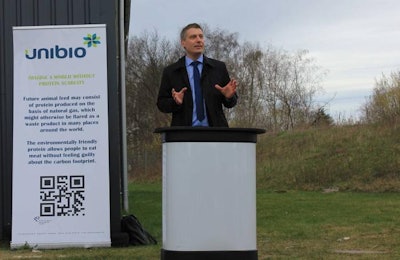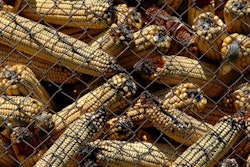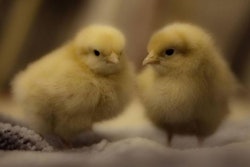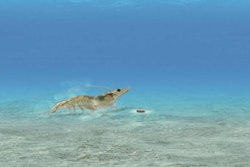
Danish biotechnology company Unibio Group has broken ground on a new facility in Kalundborg, Denmark, that will use technology that can mass produce bacterial protein for use in animal feed.
The facility, which was formerly a water treatment plan, will be remodeled for the production of bacterial protein. The product, UniProtein, will be sold as an animal feed supplement.
The new plant is expected to be completed by the end of 2016.
Henrik Busch-Larsen, CEO of Unibio, said the new facility is a “significant step forward” for his company.
“It’s a catalyst for the company,” he explained. “We’ve been developing this technology for quite some time. This is the first commercial-size production facility.”
How it works
UniProtein is produced by harnessing a natural fermentation process and mass producing it in an industrial environment.
Naturally occurring bacteria and methane from natural gas or biogas are released into water. The bacteria eat the methane, minerals and oxygen in the water and become rich in protein.
“It all comes down to creating the environment for the bacteria to grow. The more methane you can get into liquids, the higher the productivity,” Busch-Larsen said.
The company’s patented U-Loop fermenter provides optimal growth conditions for the bacteria. Natural gas, oxygen, minerals and other ingredients are continuously added while water passes through pipes. The bacteria double in number every two hours. In the downstream process, liquid is removed so the amount of biomass – or the bacteria containing the protein – increases.
The biomass is then heat treated to become a homogeneous, easy-to-digest protein granule containing almost 71 percent protein. After spray drying, the biomass becomes a natural, environmentally friendly, single-cell protein product called UniProtein.
UniProtein was approved in 1995 by an EU Commission Directive and, in 2011, it was generally approved by the EU Commission for all fish and animals.
Study results
Unibio says experiments conducted in pigs suggest that bacterial meal, when replacing soybean meal, can constitute up to 41 percent of the dietary protein for piglets and 44 percent for growing-finishing pigs without impairing growth performance. Studies also show that 41 percent crude protein from bacterial meal improves feed intake.
Studies with broiler chickens when soybean meal is replaced with bacterial meal suggest similar feed intakes at levels of up to 14 to 33 percent of the dietary protein and improved feed efficiency. Studies with broiler chickens when replacing fish meal up to 20 percent showed no difference in growth performance.
One study showed that dairy cows fed a feed mixed with UniProtein produce as much as 10 percent more milk per day, according to Unibio.
Protein for pig feed
Danish animal feed producer Vestjyllands Andel (VJA) has contracted to purchase all of the protein output from Unibio’s new Kalundborg facility to be used in pig feed.
“We are looking forward to see how it works by the pigs,” said Torben Jensen, product manager pig feed for VJA.
He said his company is cautiously optimistic about the results of using UniProtein.
“Why not take the first step and see what will happen?” Jensen said.
Environmental benefits
According to the company, while it takes one hectare of land to produce 700 kilograms of soy, the equivalent per hectare figure for UniBio is 25,000 tons. Similarly, where an estimated 600 liters of water (excluding rainwater) is used to produce one kilogram of soy, it takes only five liters of water to produce the same amount of UniProtein.
“What we can do at Unibio is decouple protein production from farming and fishing. In the future, you can let industry produce at least some of the proteins, and then you wouldn’t have to put additional stress on agriculture or the fishing industry,” Busch-Larsen reported.
The fermentation process results in a 50 percent reduction in carbon dioxide emissions compared with natural gas used for electricity production.
“This way of integrating the energy sector with the food sector is very interesting,” Busch-Larsen said.

















